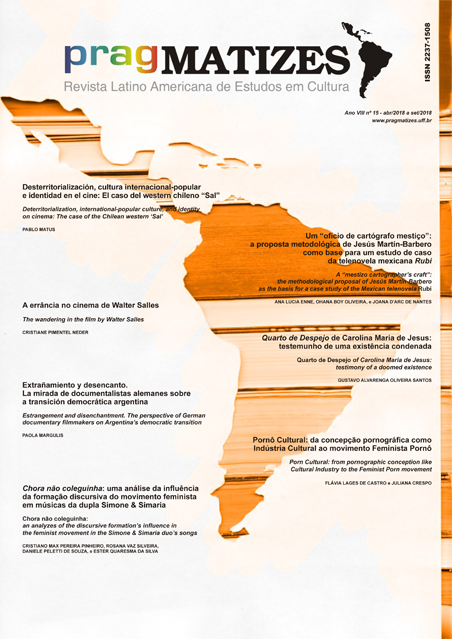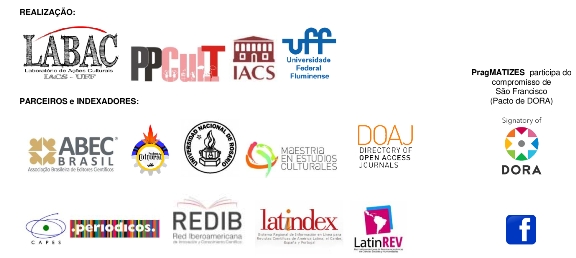Deterritorialization, international-popular culture, and identity on cinema: The case of the Chilean western ‘Sal’
DOI:
https://doi.org/10.22409/pragmatizes.v0i15.10511Abstract
This paper propose a dialogue with the tradition of cultural studies applied to the production of symbolic goods, particularly about the forms of representation of Latin American identity on media objects of globalized distribution. In this case the Chilean film "Sal" (2012) will be taken as a piece of analysis, which is declared as belonging to the western genre and has an argument according to the recognizable canon,but was directed by an Argentine (Diego Rougier), starring a Spanish (Fele Martínez) and Chileans (Patricio Contreras and Javiera Contador, among others),and has locations in Spain and Chile. For the analysis, concepts of the Brazilian sociologist Renato Ortiz regarding globalization are used, as well as what he calls deterritorialization and international-popular culture.Downloads
References
ALIM, H. Sami; IBRAHIM, Awad; PENNYCOOK, Alastair (Eds.). Global linguistic flows: Hip-hop cultures, youth identities, and the politics of language. Nueva York: Routledge, 2009.
BAUMAN, Zygmunt. La globalización. Consecuencias humanas. Ciudad de México: Fondo de Cultura Económica, 2010.
CAMPBELL, Joseph. El héroe de las mil caras. Psicoanálisis del mito. Ciudad de México: Fondo de Cultura Económica, 1959.
CASTELLS, Manuel. La era de la información. Economía, sociedad y cultura. (Vol. 1, La sociedad red). Ciudad de México: Siglo XXI, 1999.
CASTLES, Stephen; DAVIDSON, Alastair. Citizenship and migration. Globalization and the politics of belonging. Londres: Macmillan, 2000.
CHAREONWONGSAK, Kriengsak. Globalization and technology: How will they change society? Technology in Society, ano 24, n. 3, 2002.
DEMONT-HEINRICH, Christof. Cultural imperialism versus globalization of culture: Riding the structure-agency dialectic in global communication and media studies. Sociology Compass, ano 5, n. 8, 2011.
GARCÍA CANCLINI, Néstor. Culturas híbridas. Buenos Aires: Paidós, 2001.
GARCÍA CANCLINI, Néstor. Lectores, espectadores e internautas. Barcelona: Gedisa, 2007.
GRANT, Barry Keith. Film genre. From iconography to ideology. Londres: Wallflower, 2007.
GREIMAS, Algirdas Julien. Semántica estructural. Investigación metodológica. Madrid: Gredos, 1987.
HALL, Stuart. Cultural identity and cinematic representation. Framework, n. 36, 1989.
HALL, Stuart; JEFFERSON Tony (Eds.). Resistance through rituals. Youth subcultures in postwar Britain. Londres: Routledge, 1993.
INGLEHART, Ronald. Globalization and postmodern values. The Washington Quarterly, ano 23, n. 1, 2000.
JENSEN, Tommy; SANDSTRÖM, Johan. Stakeholder theory and globalization: The challenges of power and responsibility. Organization Studies, ano 32, n. 4, 2011.
KRAIDY, Marwan. Globalization of culture through the media. IN: SCHEMENT, Jorge Reina (Ed.), Encyclopedia of communication and information, Vol. 2. Nueva York: Macmillan Reference, 2002, P. 359-363.
KÜTTING, Gabriela. Globalization and the environment. Greening global political economy. Albany: State University of New York, 2004.
LANGFORD, Barry. Film genre. Hollywood and beyond. Edimburgo: Edinburgh University, 2005.
LIGHT, Duncan. Dracula tourism in Romania: Cultural identity and the state. Annals of Tourism Research, ano 34, n. 3, 2007.
LIZARDO, Omar. Understanding the flow of symbolic goods in the global cultural economy. International Journal of Contemporary Sociology, ano 45, n. 1, 2008.
LUHMANN, Niklas. Ecological communication. Chicago: University of Chicago, 1989.
LUHMANN, Niklas. Globalization or world society: How to conceive of modern society? International Review of Sociology, ano 7, n. 1, 1997.
MAYER, Vicki. Living telenovelas/telenovelizing life: Mexican American girls’ identities and transnational telenovelas. Journal of Communication, ano 53, n. 3, 2003.
MCLUHAN, Marshall; POWERS, Bruce R. La aldea global. Barcelona: Gedisa, 1995.
MCMAHON, Jennifer; CSAKI, Steve. Introduction: Philosophy and the western. IN: MCMAHON, Jennifer; CSAKI, Steve (Eds.), The philosophy of the western. Lexington: University of Kentucky, 2010, P. 1-10.
ORTIZ, Renato. Mundialización y cultura. Bogotá: Convenio Andrés Bello, 2004.
OUGAARD, Morten. Political globalization: State, power, and social forces. Nueva York: Palgrave Macmillan, 2004.
PARSONS, Talcott. The social system. Nueva York: The Free Press of Glencoe, 1959.
RITZER, George (Ed.). The Blackwell companion to globalization. Malden: Blackwell, 2007.
TAYLOR, Jessica. Romance and the female gaze obscuring gendered violence in the Twilight Saga. Feminist Media Studies, ano 14, n. 3, 2014.
TICKNER, Arlene. Aquí en el ghetto: Hip-hop in Colombia, Cuba, and Mexico. Latin American Politics and Society, ano 50, n. 3, 2008.
TURNER, Graeme. Cultural identity, soap narrative, and reality TV. Television & New Media, ano 6, n. 4, 2005.
WILLIAMS, Raymond. Television: Technology and cultural form. Londres: Collins, 1974.
Downloads
Published
How to Cite
Issue
Section
License
By forwarding an original to PragMATIZES, the authors agree that the copyright related to it is transferred to the Publishing. Articles and other writings are made available in PDF format from their publication, and they can be downloaded to institutional repositories and personal pages, provided that with their proper bibliographic indication.



